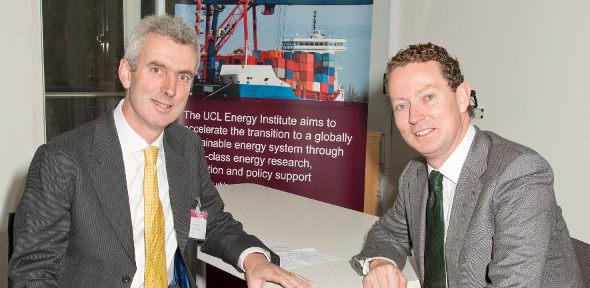
Dr Julian Allwood, of the Department of Engineering, has been appointed director of one of five new energy research centres announced this week by the Government.
The new Centre gives us a significant opportunity to identify and pursue business, policy and technology options to reduce the UK's true emissions footprint.
Dr Julian Allwood
The new End Use Energy Demand (EUED) research centres will look into the complexities of energy use across society and how energy can be both saved and used more efficiently. They are to receive over £26 million funding from two research councils, the Engineering and Physical Sciences Research Council (EPSRC) and the Economic and Social Research Council (ESRC), with a further £13 million coming from industrial partners.
Julian will lead a partnership formed with the University of Cambridge, University of Bath, University of Leeds and Nottingham Trent University with funding of £6.2m.
The UK Indemand Centre will focus on reducing the use of both energy, and energy-intensive materials, in the industries that supply the UK's physical needs, developing a better understanding of the operation and performance of the whole material and energy system of UK industry. This will identify the policy, business and consumer triggers that would lead to significant change while supporting UK prosperity.
Julian said: "I am delighted that RCUK has chosen to fund the UK Indemand Centre: a National Research Centre for reducing Industrial Energy and Material use in supplying UK needs - and to have the chance to lead this along with Professor Geoff Hammond at the University of Bath, Professor John Barrett from Leeds University, and Professor Tim Cooper at Nottingham Trent.
"Since 1990, the UK's reported emissions have fallen by 20% but emissions caused by our consumption have actually risen by 20% over the same period: the difference is entirely due to our purchasing of goods produced by industry in other countries. Industrial energy is already used efficiently, largely to make the basic materials from which we construct buildings and products. The new Centre gives us a significant opportunity to identify and pursue business, policy and technology options to reduce the UK's true emissions footprint by reducing our overall demand for new materials.
"The £6.2m funding from RCUK will support a large team of dedicated researchers in the four universities over five years, and is supported by commitments of over £5m from our industrial partners, to develop PhD projects focused on specific opportunities for material and energy demand reduction in their businesses. The Centre gives us the opportunity to position the UK at the forefront of international efforts to seek real emissions reductions in industry, and the collaboration between the four universities, business and government ensures that we maximise the value of the UK's existing knowledge and skills in the area."
Energy and Climate Change Minister, Greg Barker, who announced the funding this week, said: "We have now put energy efficiency at the very heart of the Government's energy policy. Using energy more wisely is absolutely vital in a world of increased pressure on resources and rising prices. Not only can energy efficiency help save money on bills and cut emissions, it can support green jobs, innovation and enterprise.
"The five new End Use Energy Demand centres will play an important role in improving our understanding of how energy is used across the nation, helping us learn more about what needs to be done to change consumer and business behaviour. I wish these centres every success and look forward to seeing the results."
Professor David Delpy, EPSRC's Chief Executive, said: "We had a tremendous response from the academic community to this call. In all 38 proposals were submitted and many displayed unique approaches. The five centres chosen were considered to have best demonstrated that they could develop internationally leading research and apply it to help meet the Government's 2050 challenges."
Professor Paul Boyle, Chief Executive of the ESRC, said: "I believe the interdisciplinary nature of these centres will help us to better understand the challenges faced to meet our future energy needs. The centres must work together to ensure that the full potential impact of their programmes is realised. They will engage with the public, interact with users and promote synergies between the research projects which the ESRC fully supports."
The other EUED research centres are:
Big Data (UCL). Director - Professor Tadj Oreszczyn. The main goal of the RCUK Centre for Energy Epidemiology will be to provide an evidence base for government and industry. This will help meet long term carbon emission, energy security and fuel poverty targets, and help ensure that policies such as Green Deal and Energy Company Obligation deliver value for money.
Food (Brunel University partnered with the universities of Manchester and Birmingham). Director - Professor Savvas Tassou. Taking a 'gate to plate' view the Centre for Sustainable Energy Use in Food Chains will develop innovative approaches, processes and technologies for energy demand reduction in all stages of the food chain; production, distribution, retail and consumption.
Practices (Lancaster University partnered with the universities of Aberdeen, Manchester, Leeds, Reading, Sheffield, Sussex, and UCL). Director - Professor E Shove. Focusing on how demand is made and met, the DEMAND: Dynamics of Energy, Mobility and Demand Centre will work across the sectoral boundaries of mobility and building-related energy use, creating new methodologies, techniques and approaches for data analysis, for integrating historical research with future oriented planning, and for assessing the societal viability of technological and infrastructural innovation.
Technological Transitions (University of Sussex partnered with University of Oxford). Director - Dr Steven Sorrell. The Research Centre on Innovation and Energy Demand will develop an interdisciplinary understanding of the emergence, diffusion and impact of different types of low-energy innovations in the UK and use this understanding to inform the future development of UK energy and climate policies.

